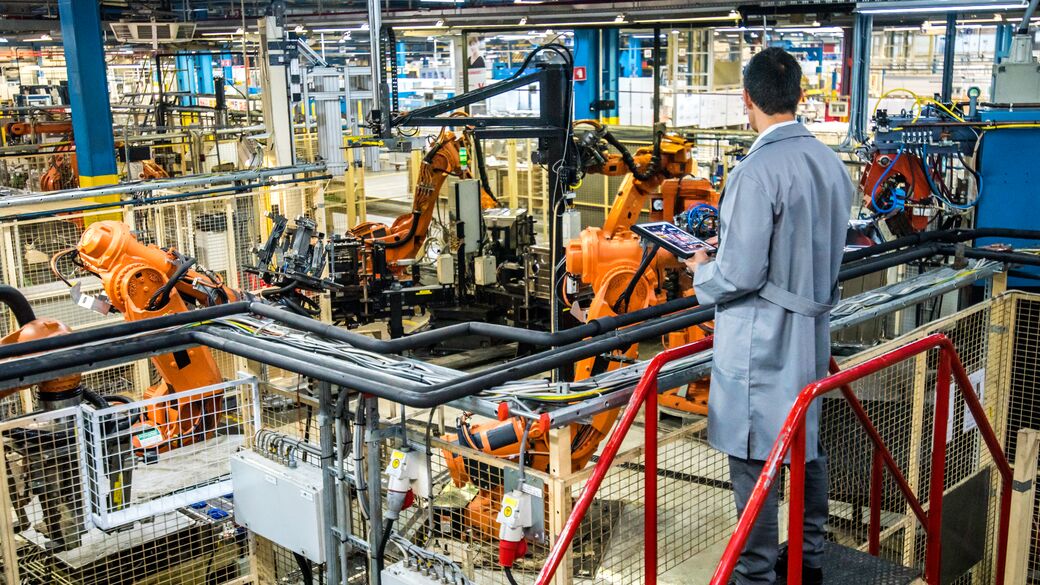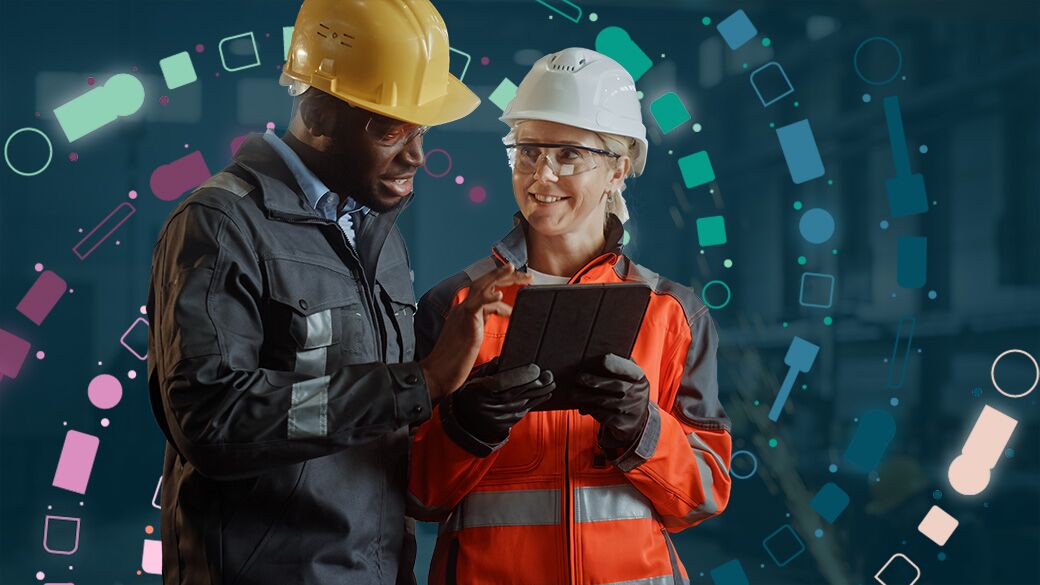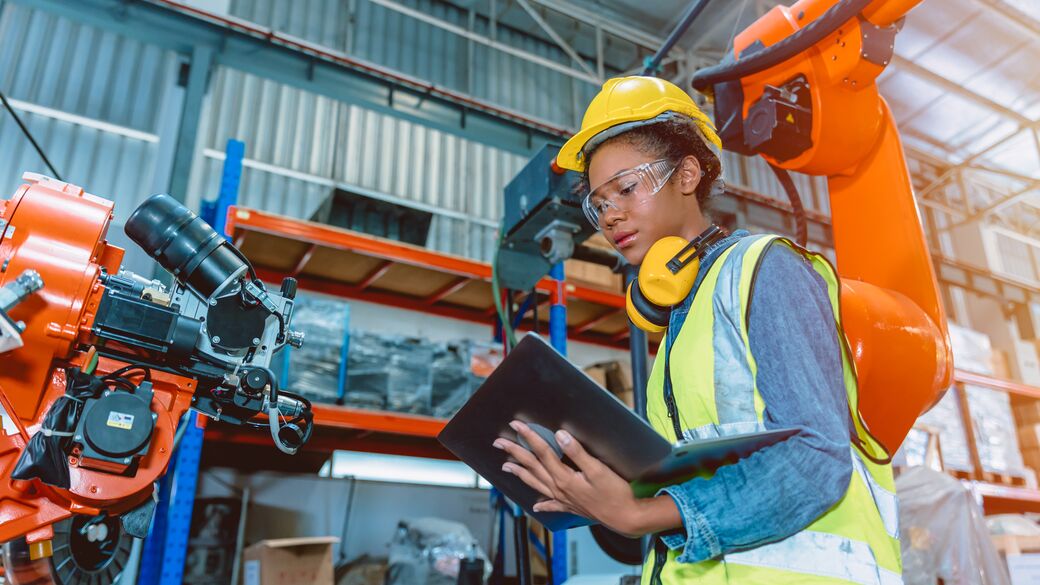Table of Contents
Browse all episodes of the Epicor podcast Manufacturing the Future in this blog post or visit the podcast home page for more information.
About Manufacturing the Future, an Epicor Podcast
This show is dedicated to helping manufacturing leaders future-proof their operations. Each episode features interviews with innovative manufacturing executives, subject matter experts, and top thought leaders. On the show, they share tips, best practices, and actionable insights to embrace technology, so that manufacturers can streamline operations, prepare for the future, and keep the world turning.
Host of Manufacturing the Future: Kerrie Jordan, VP of Product Management, Epicor
Kerrie Jordan is Group Vice President, Product Management, at Epicor Software. In her role, Kerrie leads the strategic direction of Epicor’s cloud-enabled solutions to ensure they continue to deliver high-value innovation, security, and performance for Epicor customers. Based in Richmond, Virginia, she brings nearly two decades of experience in ERP, supply chain, eCommerce, cloud computing, and product development solutions. Read more from Kerrie Jordan here.
Episode 17: Praxie's Michael Lynch on How AI is Transforming Manufacturing
Download, Listen, and Subscribe
Apple | Spotify | PodBean | Epicor
Praxie is an AI-powered software platform that advances digital transformation for discrete and process manufacturing companies. Once a company digitizes its documents and processes, the AI built into their workflows can give feedback and insights about issues seen on the factory floor, generate an action plan by tapping into a large language model, or extract insights from a company’s data to identify root causes of problems. "How do you practically apply artificial intelligence? I think that's the core question that most manufacturers are asking themselves," says Michael Lynch, CEO at Praxie. Listen to the full episode to learn more.
Episode 16: Bunting's Robert Bunting Jr. on Increasing Efficiency and Adding Value Through Digitization and Automation
Download, Listen, and Subscribe
Apple | Spotify | YouTube | PodBean | Epicor
Bunting is a family business that, since 1959, has manufactured precision magnetic products for the worldwide printing, automotive, plastics, food, electronics, pharmaceutical, and recycling industries. But Bunting is looking at how to improve their processes to stay competitive — especially when the "Amazon effect" is changing customer expectations for better service and faster delivery. "We're trying to go back and figure out how can we produce what we do, maybe less expensive. How can we do it quicker, more efficient?” says Robert Bunting Jr., President & CEO at Bunting. Listen to the full episode now to find out how.
Episode 15: Analyzing the Findings from "The Evolving Role of Financial Leaders in Manufacturing" Report
Download, Listen, Watch, Subscribe
Apple | Spotify | YouTube | PodBean | Epicor
What do finance and accounting leaders in over 200 manufacturing companies worldwide think about the evolution of their roles? In this episode, Mark Jensen, Director of Product Marketing at Epicor, joins Kerrie to discuss the findings from Epicor's "The Evolving Role of Financial Leaders in Manufacturing" report.
As Mark explains, the report shows how much the role of the CFO is changing and in many ways elevating to new responsibilities. The CFOs surveyed are also looking to new technologies like AI and business intelligence to support growth and profitability. They're also finding a lot of value in the cloud as well.
Episode 14: Voice of the Manufacturing Manager Report Insights
Download, Listen, Watch, Subscribe
Apple | Spotify | YouTube | PodBean | Epicor
What's on the minds of manufacturing leaders today? What's on their to-do lists? What do they see on the horizon? Epicor recently surveyed 400 manufacturing leaders for our "Voice of the Manufacturing Manager" report to find out more about how they're approaching technology, business strategies, worker engagement, and the future of their industry.
In this special episode of the "Manufacturing the Future" podcast, we invited three manufacturing leaders to discuss the findings of the report and to hear their perspectives on the key takeaways. Kerrie hosts John Preiditsch, President & CEO, Six S Partners; Mark Jamieson, President & CEO, 2WTech; and Ivan Rebolledo, Chief Revenue Office, Technology Coast Partners for an insightful discussion on the technology shaping manufacturing today, how to increase engagement across your workforce, and how being perceived as "modern" can promote your business.
Episode 13: Prollenium's Ario Khoshbin on Building a Tech Company from Scratch That Stays True to Its Roots
Download, Listen, Watch, Subscribe
Apple | Spotify | YouTube | PodBean | Epicor
"A lot of times you can really get stuck when you're doing something. You lose sight of what's next because you're so fixated on what you're doing that you don't think about the future," says Ario Khoshbin, Founder & CEO at Prollenium Medical Technologies in our newest podcast. And Ario has done just that in building a medical aesthetics technology company from scratch, learning the ins and outs of the industry as it scaled, and instilling a mindset of constant innovation.
As Ario explains, Prollenium Medical Technologies started with a $300 loan and is now a company that employees 300 people. Instead of hiring expertise from already established companies, Ario built it from scratch, learning how to create formulas for their products and ensuring that they're being produced in sterile environments.
As they grew, they implemented more technology like HR software and an ERP system to empower employees, especially to keep the pulse of employees as the environment scaled. Ario founded the company after working with his immigrant parents in their own businesses, and being inspired by their hard work. That’s been another factor he’s focused on: scaling a company while staying true to his family roots and values.
Connect with Ario Khoshbin and Prollenium Medical Technologies
Prollenium | Ario Khoshbin on LinkedIn
Episode 12: Cre8tive Technology and Design's Bob Aronson on Using ERP to Stay Compliant, Reduce Risk, and Improve Operations in the A&D Industry
Download, Listen, Watch, Subscribe
Apple | Spotify | YouTube | PodBean | Epicor
"When we look at some of the technology or capability that our aerospace and defense manufacturers are looking for, it really is centered around how can we let technology improve their operation and put a minimum impact on the resources or the people that they have inside their organization?" That's what Bob Aronson, Chief Revenue Officer at Cre8tive Technology and Design, does each day: help manufacturing customers understand how to leverage technology to either obtain or maintain compliance in a very rapidly growing industry.
Manufacturers in the aerospace and defense industry need a number of elements to be successful. Not only do they need methods in which to track their manufacturing and visibility into their operations in order to stay productive and efficient. Manufacturers with government contracts also need to stay compliant to certain regulations as well, like the Cybersecurity Maturity Model Certification (CMMC) that ensures contractors have safe cybersecurity practices. A failure to stay compliant can mean losing their contract.
How does an ERP system play into this?
Connect with Cre8tive Technology and Design
Cre8tive Technology and Design
Episode 11: Knowing When to Automate, Digitize, and Modernize While Moving Quickly in R&D
Download, Listen, Watch, Subscribe
Apple | Spotify | YouTube | PodBean | Epicor
"The leader of the lab asked me, 'So what are you really all about? Do you love building things or doing research?' And in my heart, I knew that the answer was building things." For David Merrill, it was his love of building things and his realization that "logistics needs better solutions” that led him to create a new approach to enable same-day shipping to every person on the planet: Elroy Air.
By using autonomous cargo aircraft systems, Elroy Air is doing more than just making sure your package gets to you quickly. They envision the ability to provide humanitarian aid, disaster relief, and resupply in locations that may be challenging to reach with current aircraft. But building new types of aircraft requires finding ways to manage materials, product requirements, compliance, software updates, and more.
As Elroy Air continues to invest in R&D and prove that their technology works, the question now is: When do we begin to integrate technology to help scale our efforts? When do we transition from pen and paper that allowed us to move fast to digital systems that can standardize, automate, and scale our production?
Connect with David Merrill and Elroy Air
Elroy Air | David Merrill on LinkedIn
Episode 10: UST’s Daniel Izhaky On How Technology Can Increase Productivity Efficiency and Quality
Download, Listen, Watch, Subscribe
Apple | Spotify | YouTube | PodBean | Epicor
"We're competing against regions that have extremely low cost of labor, cost of utilities … extremely low-priced product that we would never be able to compete with if we weren't using all of this technology," says Daniel Izhaky, CEO at United Safety Technology (UST). What is UST competing on? Producing high-quality PPE masks and gloves for frontline healthcare workers.
When the PPE shortage began to impact healthcare workers during the pandemic, Daniel and UST took action to fill the manufacturing void. Facing supply chain issues and challenges sourcing from overseas, they decided to ramp up production domestically to produce N95 masks and nitrile exam gloves. A federal government contract helped boost manufacturing, and today, they run lines that produce between 45,000 to 48,000 units per hour, surpassing the industry standard of 30,000.
But maintaining that manufacturing efficiency and ensuring quality requires technological innovation, something that UST has thoroughly embraced.
Connect with Daniel Izhaky and United Safety Technology
United Safety Technology | Manufacturing Extension Partnership (MEP) resource | Daniel Izhaky on LinkedIn
Episode 9: Continuously Improving Upon Global Tooling and Plastics Manufacturing
Download, Listen, Subscribe
Apple | Spotify | PodBean | Epicor
"If you do things right and if you focus on quality and on time delivery and don't take the shortcuts, then you can be — relatively quickly — relatively successful," says Marc Weinmann, Owner and President of VEM, about the early years of creating and scaling VEM, a plastics manufacturing and tooling company.
VEM started as an electronics company in Hong Kong in 1998, printing circuit boards and doing assembly, until a customer asked them to make a plastic housing around the circuit board. After that initial creation, they moved more into tool making and plastics, opening locations first in China, then in other locations around the world. Today, VEM offers a full range of services including prototyping, production mold making, injection molding, component sourcing, testing, packaging, and more, in the medical, aerospace, automotive, and consumer plastics space.
Of course, global manufacturing companies, especially those creating medical devices, face not only complexity challenges but they need to ensure high-quality standards as well.
Connect with Marc Weinmann and VEM
3D steel printing video | VEM-tooling | VEM-medical | Marc Weinmann on LinkedIn
Episode 8: Hitting a Home Run with Scalable and Simple Manufacturing
Download, Listen, Watch, Subscribe
Apple | Spotify | YouTube | PodBean | Epicor
"I had no real path that I knew I wanted to go in.” It was what Randall Thompson was thinking when, after playing baseball all his life, the Toronto Blue Jays released him. "I knew I wanted to be creative and I wanted to create things. So I started Dugout Mugs."
The idea was simple: Take the barrel of a baseball bat, hollow it out, and turn it into the "ultimate game day mug." Of course, while the idea was simple, creating the first prototypes took a bit of work. "I didn't know what a wood lathe was. I didn't know anything about woodworking in the beginning. I tried to make one myself, and unsuccessfully," Thompson tells us in our newest podcast episode. Eventually he found the right resources to create the mug he envisioned.
Thompson began the company in 2014, but saw major growth during the pandemic when there was an increase in online purchasing, and people had stimulus checks to spend. Since then, Dugout Mugs has seen hyper-growth in the ecommerce space. So how does a company keep up?
Connect with Dugout Mugs
Episode 7: Breathing Easier Through Manufacturing Innovation, Ideas, and Technology
Download, Listen, Watch, Subscribe
Apple | Spotify | Google | YouTube | PodBean | Epicor
"Is there a way to make his environment better that perhaps would reduce asthma triggers and really improve his quality of life?" It's the question that Peter Mann asked when trying to find solutions in 2009 to improve life for his asthmatic son. The question led him to start Oransi, which today is a leading manufacturer of HEPA air purifiers, and a leader in clean products and technologies. Just in the past two years, they've seen a 122% growth.
Air purification has had rising demand, but the COVID pandemic raised the awareness around cleaner indoor air even more. Mann attributes much of Oransi's growth in the past few years to that increased customer demand. But many new brands have entered the space as well, increasing competition. "I like to say we were doing air cleaning before it became cool," says Mann in our newest podcast. "But now, anybody with any somewhat related appliance or brand is putting their name on air purifiers."
In addition to its continued growth, Oransi is focusing on reshoring and growing its manufacturing operations in Virginia. How can a manufacturing company keep growing and make sustainable changes for the future?
Connect with Peter Mann and Oransi
Oransi | Peter Mann on LinkedIn
Episode 6: Managing Operational Complexity and Reducing Waste by Thinking Inside the Box
Download, Listen, Subscribe
Apple | Spotify | Google | PodBean | Epicor
"Very few people start businesses, fail, and then try the same business again. So I did and — knock on wood — it worked the second time around," says Marty Metro, Founder and CEO of UsedCardboardBoxes and UCBZeroWaste, in our newest podcast episode. It was a simple problem he was trying to solve: he didn't want to spend money on new boxes to move. As Metro drove around to find used, free boxes discarded by stores, he realized there was a business model there: gather used boxes and get them to companies who need them.
The first business he started that did this was a "colossal failure." But Metro tried again, this time launching UsedCardboardBoxes differently, with "funding and technology, and a focus and a management team and infrastructure." Today, they are the largest processor of used boxes in North America and their clients include Dole, General Mills, Kellogg's, McCormick Spice, Walmart, and Walgreens.
But how do you manage the operations of a company with such high complexity and intricacy that involves sourcing a box with a specific dimension in one location and getting it to a customer across the country?
Connect with Marty Metro and UsedCardboardBoxes and UCBZeroWaste
UsedCardboardBoxes | UCBZeroWaste
Episode 5: Disrupting the Future of Ice with Better Processes and Great People
Download, Listen, Subscribe
Apple | Spotify | Google | PodBean | Epicor
How can you improve on ice delivery? It's an industry that's been around for centuries, yet it hadn't changed much — then, it was chopped-up chunks of ice on the back of a buggy, and now, companies are manufacturing ice in a plant and putting it on a diesel truck with a heavy carbon footprint for delivery. "We believe that this is a space that can be easily disrupted," said Ben Gaskill, Director of Sales at Everest Ice and Water Systems, in our most recent podcast episode. "What we believe is that ice and water vending is the way that ice will be delivered to the consumer in the future. That we can make a better product, fresh and on demand at the point of use, where the customer is."
While ice vending machines have been around for twenty-three years, Everest Ice and Water Systems saw that they could make a better product with better technology, that's more sanitary and 30% more efficient than other machines. And customers are responding, as Everest Ice and Water has seen a three-year revenue growth of 850%.
Connect with Ben Gaskill and Everest Ice and Water
Episode 4: Reimagining Retail Manufacturing: Improving Supply Chains and Creating a More Sustainable World
Download, Listen, Subscribe
Apple | Spotify | Google | PodBean | Epicor
"I started To the Market because I believe fundamentally that the retail manufacturing industry can and should be reimagined," states Jane Mosbacher Morris in our newest podcast episode. Morris is the Founder and CEO of To the Market, a turnkey solution for ethical manufacturing by democratizing access to the global supply chain. "But how I even discovered that that was an opportunity was a little bit of a winding road."
After spending time in the public sector in counterterrorism, Morris realized how impactful the private sector can be. She saw that if you could leverage market forces to drive change, an organization can have an impact on social and environmental opportunities.
With that drive, Morris turned to retail manufacturing, an industry that was in need of reimagining, and created To the Market, which connects companies to a syndicated network of sustainable, story-rich suppliers, improving sustainability efforts and increasing ethical sourcing in their supply chain. To the Market recently ranked in the top 20% of the Inc. 5000 list of America's fastest growing private companies.
Connect with Jane Mosbacher Morris and To the Market
To The Market | Instagram | Twitter | Jane Mosbacher Morris on LinkedIn
Episode 3: Digitizing Manufacturing for Better Products and Future Growth
Download, Listen, Subscribe
Apple | Spotify | Google | PodBean | Epicor
It's a common problem: someone's laptop or phone dies and they don't have a charger. Or they have a charger and need to find an outlet to plug it in to. Matt Buscher noticed this with colleagues and especially travelers needing access to outlets in an airport. He knew he could solve that problem with power station kiosks that could provide a charge. But those kiosks could do more, he realized, like rent laptops. Buscher saw a need in the market for this, especially at universities and public libraries, and LaptopsAnytime was born. Located in every continent except Antarctica, LaptopsAnytime has frequently appeared in Inc. 5000’s Most Successful Companies in America.
But how do you build and assemble products that are constantly changing? How do you successfully scale a company with such intricate manufacturing considerations, going from subbing out manufacturing and assembling to bringing it all in-house? Matt might have provided a much needed solution for those wanting access to rental laptops, but there were more problems to be solved.
Connect with Matt Buscher and LaptopsAnytime
LaptopsAnytime | Matt Buscher on LinkedIn
Episode 2: Scaling Your Manufacturing in a Capital-Intensive Industry
Download, Listen, Subscribe
Apple | Spotify | Google | PodBean | Epicor
"I have to create opportunities for myself, right?" It was the thought Jordan Erskine had after years of working for other manufacturing companies, first for a cosmetics and skincare contract manufacturer, then for a large dental care manufacturer. But after 15 years in the industry and armed with an MBA, Jordan reached out to his co-founder Gavin Collier and proposed starting a business. With a space and some angel investments, they launched Dynamic Blending in 2015 as a small lab creating formulas for brands, with an outside manufacturer.
But Jordan, with his experience in manufacturing, knew he could do it better.
"Quickly we realized we need to do it all. We have to figure out a way to do it all because everybody's doing it wrong. Nobody's taking care of the small guys, or the startups, or people that could have good ideas," Jordan explains in our podcast episode. Today, Dynamic Blending offers not only formula creation and manufacturing, but branding, package design, marketing assistance, fulfillment, and more. They recently ranked seventeenth on Inc. 5000's list of America’s Fastest-Growing Private Companies.
But how do you go from an idea to competing against some of the biggest companies in the world in a low-margin, capital-intensive industry?
Connect with Jordan Erksine and Dynamic Blending
Dynamic Blending | Jordan Erksine on LinkedIn
Episode 1: Escapod Founders on How They Became the Ninth Fastest-Growing Manufacturing Company
Download, Listen, Subscribe
Apple | Spotify | Google | PodBean | Epicor
Lifelong campers, Chris and Jen Hudak wanted to fit outdoor adventure into their busy schedules. But they had a problem: they spent more time setting up camp than actually camping.
In 2016, they went into a family garage and built their own off-road teardrop trailer. The custom design not only helped them take back their adventure time—it gave them a product to take to market.
Today, their company Escapod has more than 70 employees and was recently named the ninth fastest-growing manufacturing company by Inc. But rapid growth brings a whole new set of problems.
Connect with Chris and Jen Hudak and Escapod
Escapod | Instagram | Chris Hudak on Instagram | Jen Hudak on Instagram | Jen Hudak on LinkedIn








